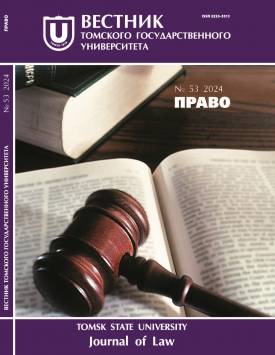Formation of values in international law: historical and legal analysis
At present, in the transitional period of the evolution of the international legal system, it becomes more relevant than ever to turn to historical and legal studies of various aspects of the formation of international law, to search for political and legal constants, evolutionary regularities, legal traditions and, of course, legal values formed at previous stages, because it is they who keep the results of past legal activity and allow understanding and reforming the current legal systems, determining the conceptual vectors of development. Legal values, among other things, have a direct normative form. First of all, these are principles of law as basic principles reflecting the general format of legal regulation in a particular legal system at a particular stage of its development. Principles allow building a legal system in accordance with the (ideal) attitudes of society, their nonrecognition or ignoring leads to various kinds of conflict situations in society. Principles of law are designed to fulfil the axiological function, which consists in the fact that they include the understanding of values in law, in the legal system, legislate the basis of the legal ideal. International law, as well as national law, can certainly be considered as an object of value relation from the standpoint of the categories of good and evil, true and untrue, permissible or prohibited, just and unjust. International law as an independent legal system has been recognised since the 19th century, at the same time, as a result of the intensification of international relations, international law was actively developed. In parallel, the corresponding international legal values began to be formed, including those reflected in the principles of international law, which in this period have not yet been legally formalised, however, on the basis of the analysis of international legal relations can be formulated. In the author's opinion, such principles include the principle of co-operation, the principle of settling disputes by peaceful means, the prohibition of trade in Negroes, and the legal status of diplomatic representatives and consular agents. These principles are directly related to the international legal values that were in the process of formation. In the course of the conducted research it was established that in the XIX century, the period of active formation of international law, including the formation and formalisation of international legal values took place. Despite the fact that the considered legal values and relevant principles back in the XIX century, we cannot but note that they have their direct significance for modern international law. Moreover, international legal values are in direct relationship with the legal values of individual states and influence national legal systems and their values. The author declares no conflicts of interests.
Keywords
legal values, principles of law, history of international lawAuthors
| Name | Organization | |
| Tretyakova Ekaterina S. | Perm Branch of the National Research University Higher School of Economics | etretyakova@hse.ru |
References

Formation of values in international law: historical and legal analysis | Tomsk State University Journal of Law. 2024. № 53. DOI: 10.17223/22253513/53/6
